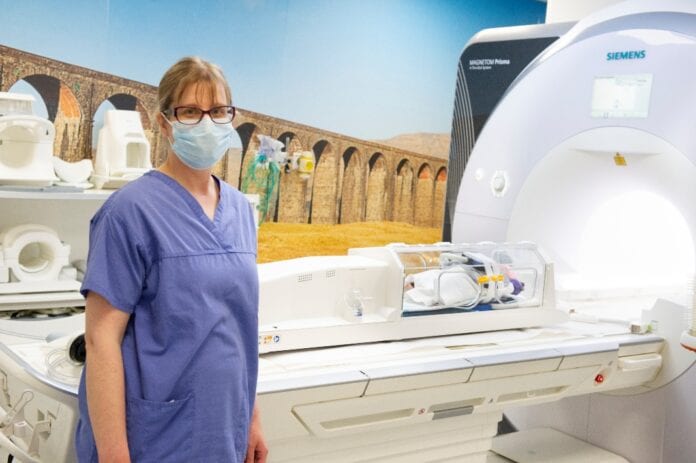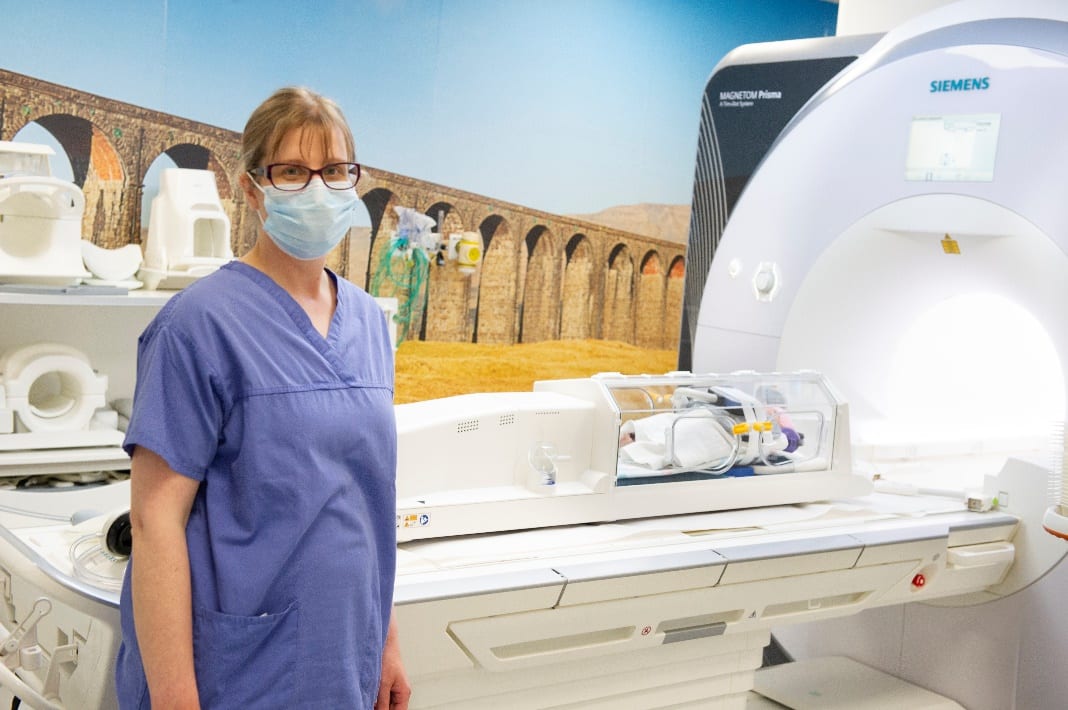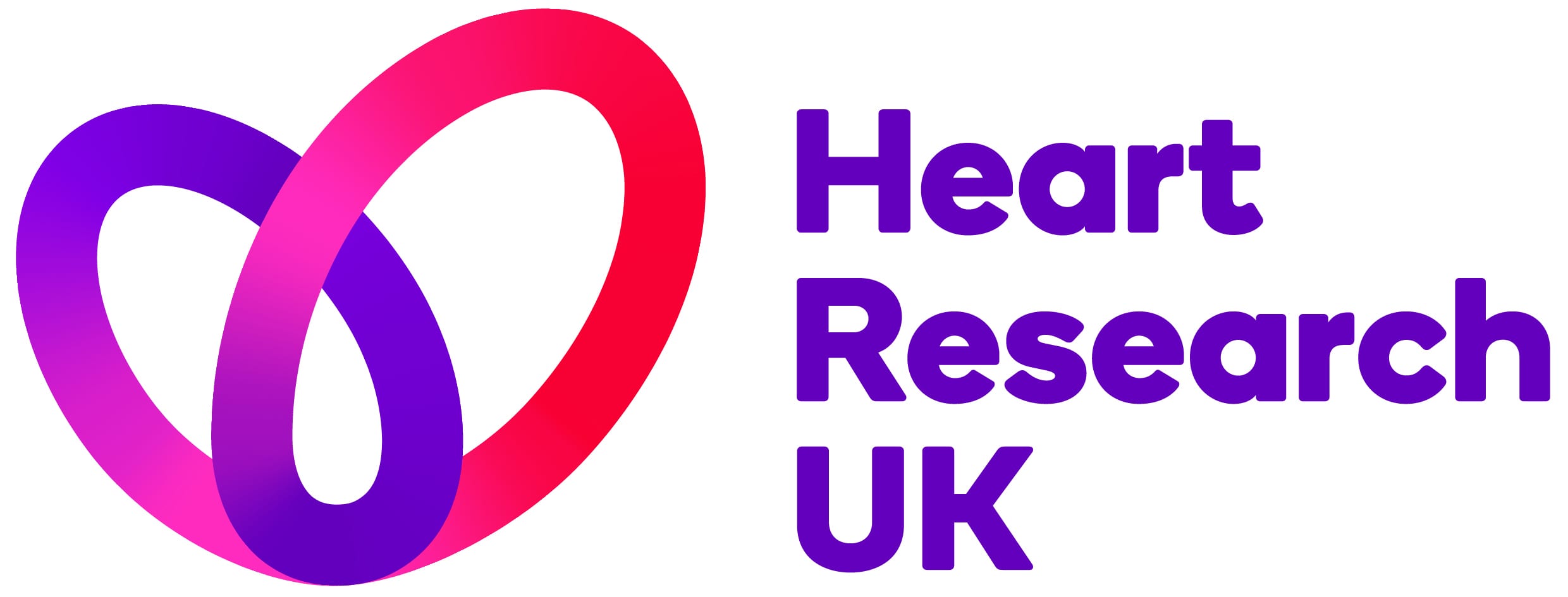
- The Leeds Teaching Hospitals NHS Trust and the University of Leeds host the first UK research project focused on improving magnetic resonance imaging of infants with congenital heart disease using 4D flow.
- The 4D Flow MRI prototype software provided by Siemens Healthineers allows rapid acquisition of anatomical and functional data in a single imaging session to reduce image acquisition time.
- Children’s Heart Surgery Fund, amongst others, raise funds for advanced MRI-safe equipment designed to improve imaging outcomes and patient experience.
The Leeds Children’s Hospital’s Congenital Heart Unit is the first in the United Kingdom to undertake pioneering research addressing challenges in the diagnosis and monitoring of infants with congenital heart disease. The project aims to establish a new approach to imaging these patients by using a 4D Flow MRI prototype software from Siemens Healthineers, reducing scan time to under ten minutes whilst infants sleep in an MRI safe incubator.

Congenital heart disease is one of the most common types of birth defect and whilst survival rates have improved, diagnosis and imaging of newborns can be challenging. Traditionally, CT imaging has often been preferred over MRI, due to reduced acoustic noise and faster scan times, while MRI has necessitated breath holds and patient sedation with the associated risk to infants. The use of CT however, requires X-rays and produces a less comprehensive dataset than MRI. The University of Leeds project pushes the boundaries of 4D Flow and cardiac MRI to establish an approach which could provide greater data at a high speed and transform the way imaging is performed on infants.
Acquiring a full set of MRI images which provide both anatomical and functional information, can take up to an hour, however, with the application of the 4D Flow technology from Siemens Healthineers, the project aims to achieve this in under ten minutes. 4D Flow provides a comprehensive, non-invasive assessment of the heart in just one acquisition, allowing paediatric cardiologists greater insight with potential to predict which patients may need surgery in the future.
Donations led by Children’s Heart Surgery Fund, including Heart Research UK and other generous funders have helped to equip the Leeds Congenital Heart Unit with innovations designed to optimise scanning infants. The new equipment includes an MRI coil and an MRI safe closed incubator, which reduces the noise the infant is exposed to, allowing scans to take place as the baby sleeps in a safe and comfortable environment – supporting improved diagnostic outcomes.
“The research we are currently undertaking makes the University of Leeds the first in the UK to scan babies with congenital heart disease this way,” states Dr Malenka Bissell, Clinical Lecturer of Paediatric Cardiology at the University of Leeds and Consultant at Leeds Children’s Hospital. “In combination with the equipment funded by the charity, 4D Flow MRI technology is paving the way to improve diagnostic pathways for these patients. Uncertainty can be one of the most stressful elements for parents, so we’re now looking at how we can use advanced imaging methods to improve our ability to predict when and if a patient will need surgery.”
“4D Flow MRI is an exciting advancement, offering the ability to measure and visualise the temporal evolution of complex vascular systems,” states Dr Craig Buckley, Head of Research and Scientific Collaborations at Siemens Healthineers GB&I. “We are pleased to support Leeds with its research and further evaluate the potential of this model to translate into real-world application. Not only could this make for a safer experience for infants, but 4D Flow acquisition has the potential to enhance anatomical imaging, providing the clinician with a much better dataset to help inform diagnosis and treatment.”
James Oliver, Congenital Cardiologist and Children’s Heart Surgery Fund Trustee adds: “This exciting new equipment is revolutionising congenital cardiac MRI. For the first time, even our youngest congenital patients can benefit from important research into improving early diagnosis.”
Kate Bratt-Farrar, Chief Executive at Heart Research UK said: “We are so thrilled to be supporting this pioneering research, which will make Leeds one of the true centres of excellence for this type of procedure. As a Leeds-based charity, we’re passionate about supporting our local area, and about funding projects that bring about tangible benefits for patients. By reducing risks associated with traditional imaging methods and increasing diagnostic accuracy, this project will have a real effect on how capable we are of providing better care to patients, in this case often very unwell babies.”
Help keep news FREE for our readers
Supporting your local community newspaper/online news outlet is crucial now more than ever. If you believe in independent journalism, then consider making a valuable contribution by making a one-time or monthly donation. We operate in rural areas where providing unbiased news can be challenging. Read More About Supporting The West Wales Chronicle























